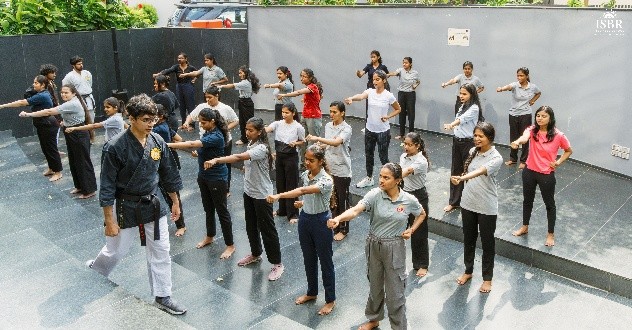ISBR Empowers Women Leaders of Tomorrow Through Self-Defense Masterclass
In a powerful initiative by the HR Club, ISBR Business School in collaboration with the OSK Federation of India, Bangalore, organized a dynamic self-defense masterclass tailored specifically for young women. This initiative underscores an urgent global priority—empowering girls with the confidence, resilience, and readiness to safeguard their personal space and assert their rights.
In an age where gender safety is increasingly at the forefront of societal conversations, self-defense is no longer optional—it’s essential. Beyond physical tactics, self-defense training nurtures mental strength, emotional control, and situational awareness. It transforms passive fear into active preparedness, equipping girls to not just defend but to thrive.
Why Self-Defense Training is a Strategic Imperative
Most traditional education systems focus on academic excellence but overlook personal safety training, especially for girls. However, a comprehensive approach to leadership development must integrate both.
Self-defense education cultivates:
- Confidence and Self-Worth: Mastering techniques instills a deep sense of personal agency and esteem.
- Discipline and Focus: Repetitive, structured practice strengthens emotional control and concentration.
- Environmental Awareness: Participants develop the ability to read social cues, identify risks, and respond proactively.
- Empowerment and Autonomy: The training enables girls to reclaim their space and make independent, high-stakes decisions under pressure

Core Components of Effective Self-Defense Training
- Situational Awareness
This is the first and most critical layer of defense. Students are taught to remain conscious of surroundings, recognize behavioral red flags, and anticipate exit strategies—skills that mirror corporate risk management in many ways. - Verbal Assertiveness
Learning to say “NO” with authority is essential. Assertive communication prevents escalation and reinforces boundaries, a trait shared by effective negotiators and strategic leaders. - Targeted Physical Techniques
The session covered high-impact, low-effort maneuvers, such as:
- Palm strikes and elbow jabs
- Knee thrusts and foot stomps
- Breaking free from wrist or shoulder grabs
These techniques are designed to create an opportunity for escape, not combat.
- Palm strikes and elbow jabs
- Escape and Evasion Strategies
Leveraging accessible objects (e.g., keychains, handbags, whistles) and recognizing allies in the environment forms a critical part of safety training. - Voice–Body Synchronization
Practicing vocal assertion—yelling “BACK OFF!”—in tandem with physical action increases visibility, draws attention, and destabilizes aggressors. - Posture and Non-Verbal Cues
Body language matters. Predators often target individuals who appear insecure. Standing tall, making eye contact, and moving decisively convey control and deter aggression.
Cultivating a Culture of Awareness and Action
ISBR’s initiative mirrors efforts at elite global institutions, where gender-inclusive safety programs are embedded within leadership training curricula. For meaningful societal change, parents, educators, and policymakers must advocate for and institutionalize personal safety training across all educational levels.
Empowerment Begins with Preparedness
True empowerment lies in the ability to protect one’s dignity, autonomy, and physical well-being. By facilitating this masterclass, ISBR not only reaffirms its commitment to academic excellence but also upholds its responsibility to nurture leaders who are courageous, composed, and capable—on campus and beyond.
Such programs aren’t extracurricular—they are essential.

At ISBR, we believe every girl deserves the right to feel safe, speak with confidence, and lead without fear.
About ISBR Business School: ISBR Business School, located in Bangalore, India, is a premier institution dedicated to providing world-class education in business and management. Accredited by the NBA and recognized by the Association of Indian Universities and the Ministry of HRD, Government of India, ISBR has consistently been ranked as a platinum institute by AICTE-CII. With a diverse student body, a strong emphasis on industry collaboration, and a curriculum designed to foster innovation and leadership, ISBR Business School is committed to shaping the business leaders of tomorrow. The school’s robust placement record and partnerships with top global companies underscore its commitment to excellence and career readiness for its students

